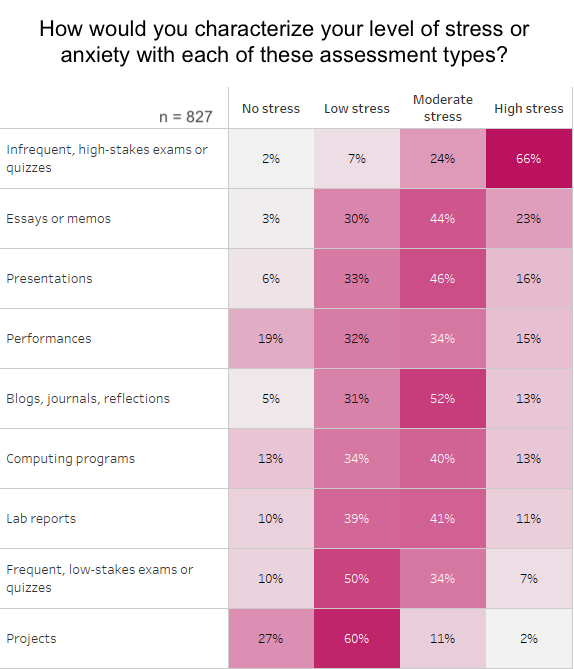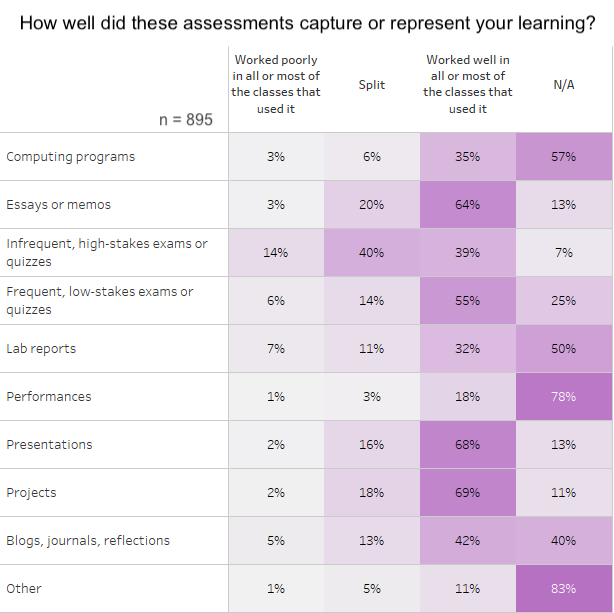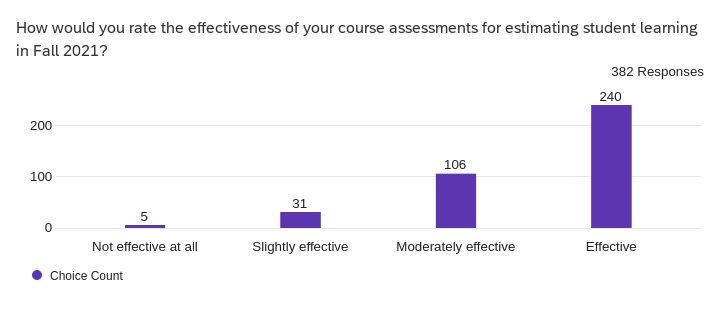In December 2021, the Trinity Office of Assessment completed a survey of undergraduate students about their living and learning experiences at Duke in the Fall term. The survey questions touched on several broad topics, including wellness, academics and academic support, assessment of learning, and learning technologies. Students reported very clearly on assessment practices that support their learning. The post below summarizes these key results. Thanks to Dr. Jennifer Hill, Dr. Alessandra Dinin and others in the Office of Assessment for data and visuals.
Students reported the amount of stress or anxiety they feel with various types of assessments commonly used in Duke courses. One point to note is that infrequent, high-stakes exams or quizzes are reported as highly stressful or anxiety-causing for two-thirds of students overall. Other forms of assessment were reported as mostly moderate or low stress. This result aligns with assessment best practices, which suggest moving away from infrequent high-stakes exams to more-frequent, lower-stakes assessments and/or more authentic assessments such as projects, presentations, authentic writing assignments, and others.

Students were asked which forms of assessment they felt best captured or represented their learning, and rated infrequent, high-stakes exams as the least representative of their learning, of all the surveyed assessment types. Performances and programming assignments were rated the highest, although performances were used in a low number of courses. Student comments reinforce these findings. They overwhelmingly say that the optimal way to demonstrate learning is through frequent quizzes, essays and other writing assignments, projects, presentations and research.

Overall, students felt that more authentic, nuanced types of assessment, such as presentations, projects, writing assignments, performances, and programming assignments were better representations of their learning and growth. These results align with assessment best practices, which suggest focusing on these types of assessments designed according to the courses’s learning objectives, as good ways to demonstrate and support student learning (particularly when designed to include options for revision based on feedback). When designing tests and quizzes, reflect on what we want from them, and how their format and timing can encourage authentic performance and support learning. This Guide about Designing and Grading Course Work may provide some suggestions.
In a concurrent faculty survey in Fall 2021, faculty were asked how reflective they felt their assessments were of student learning. Based on the results there seems to be a higher sense among faculty that their assessments are reflective of student learning, than there is among students. Both faculty and students reported that a high percentage of classes use exams or quizzes, and these types of assessments, particularly if given infrequently and not well-designed, can poorly capture student learning.

The overall takeaway in the student survey results is that Duke students feel their learning is better supported and reflected by assessment approaches aligned with best practices from the pedagogical literature:
- Frequent lower-stakes assessments to provide more opportunities to demonstrate and gauge learning,
- More authentic assessments (writing, projects, presentations, performances) rather than (only) high-stakes exams and tests,
Faculty who would like a consultation on the assessment strategy in their course can contact learninginnovation@duke.edu.

